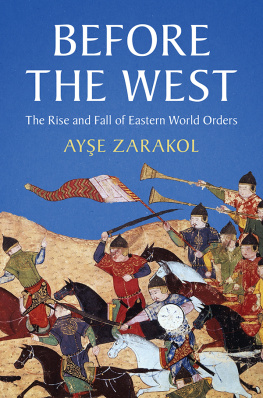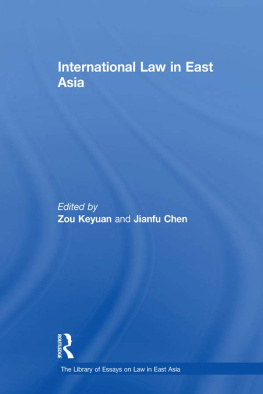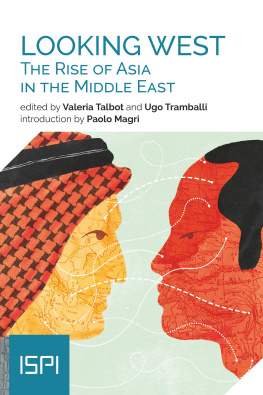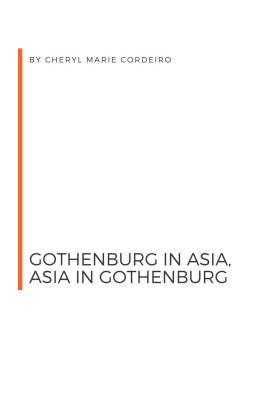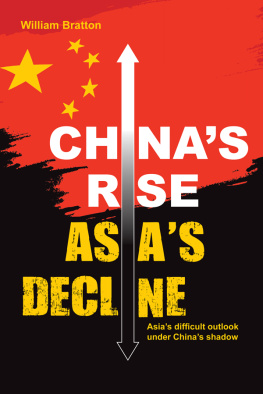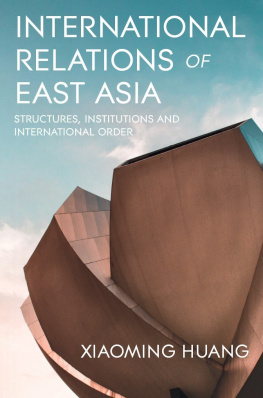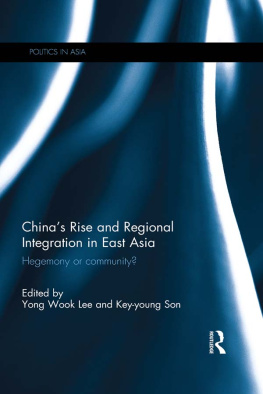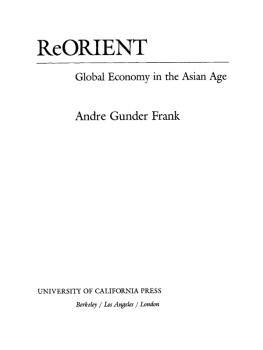How would the history of international relations in the East be written if we did not always read the ending the rise of the West and the decline of the East into the past? What if we did not assume that Asia was just a residual category, a variant of not-Europe, but saw it as a space with its own particular history and sociopolitical dynamics, not defined only by encounters with European colonialism? How would our understanding of sovereignty, as well as our theories about the causes of the decline of Great Powers and international orders, change as a result? For the first time, Before the West offers a grand narrative of (Eur)Asia as a space connected by normatively and institutionally overlapping successive world orders originating from the Mongol Empire. It also uses that history to rethink the foundational concepts of international relations, such as order and decline.
Aye Zarakol is Professor of International Relations at the University of Cambridge and a Fellow at Emmanuel College. She is the author of After Defeat: How the East Learned to Live with the West (Cambridge University Press, 2011) and the editor of the prize-winning Hierarchies in World Politics (Cambridge University Press, 2017).
Series Editors
George Lawson (Lead Editor)
Department of International Relations, London School of Economics
Kirsten Ainley
Department of International Relations, London School of Economics
Aya ubuku
Department of Sociology, London School of Economics
Stephen Humphreys
Department of Law, London School of Economics
This series, published in association with the Centre for International Studies at the London School of Economics, is centred on three main themes. First, the series is oriented around work that is transdisciplinary, which challenges disciplinary conventions and develops arguments that cannot be grasped within existing disciplines. It will include work combining a wide range of fields, including international relations, international law, political theory, history, sociology and ethics. Second, it comprises books that contain an overtly international or transnational dimension, but not necessarily focused simply within the discipline of International Relations. Finally, the series will publish books that use scholarly inquiry as a means of addressing pressing political concerns. Books in the series may be predominantly theoretical, or predominantly empirical, but all will say something of significance about political issues that exceed national boundaries.
Previous books in the series:
Culture and Order in World Politics Andrew Phillips and Christian Reus-Smit (eds.)
On Cultural Diversity: International Theory in a World of Difference Christian Reus-Smit
Before the West
The Rise and Fall of Eastern World Orders
Aye Zarakol
University of Cambridge
University Printing House, Cambridge CB2 8BS, United Kingdom
One Liberty Plaza, 20th Floor, New York, NY 10006, USA
477 Williamstown Road, Port Melbourne, VIC 3207, Australia
314321, 3rd Floor, Plot 3, Splendor Forum, Jasola District Centre, New Delhi 110025, India
103 Penang Road, #0506/07, Visioncrest Commercial, Singapore 238467
Cambridge University Press is part of the University of Cambridge.
It furthers the Universitys mission by disseminating knowledge in the pursuit of education, learning, and research at the highest international levels of excellence.
www.cambridge.org
Information on this title: www.cambridge.org/9781108838603
DOI: 10.1017/9781108975377
Aye Zarakol 2022
This publication is in copyright. Subject to statutory exception and to the provisions of relevant collective licensing agreements, no reproduction of any part may take place without the written permission of Cambridge University Press.
First published 2022
A catalogue record for this publication is available from the British Library.
ISBN 978-1-108-83860-3 Hardback
ISBN 978-1-108-97167-6 Paperback
Cambridge University Press has no responsibility for the persistence or accuracy of URLs for external or third-party internet websites referred to in this publication and does not guarantee that any content on such websites is, or will remain, accurate or appropriate.
A Cihannma
dedicated to the memory of my father,
Cihan Zarakol (19492016),
who taught me to love history as if it were a puzzle.
Contents
Figures and Maps
Figures
Maps
Acknowledgements
Any book, especially one so long in the making, is a product of the generosity of friends and family towards the author. This is compounded in my case by the fact that I wrote this book during a particularly difficult time, partly due to reasons specific to my personal situation and partly due to the state of the world. I owe a lot of gratitude to a lot of people, many even beyond those I am able to list here by name.
Initially I had set out to write a more straightforward book challenging the conceptions of rising powers operating in International Relations (IR). The sudden passing of my father in 2016 made me rethink the project. My father was a lifelong (amateur) student of history. My best childhood memories involve traipsing around half-excavated archaeological sites around Turkey with him. I decided to try to write something a bit more durable in my fathers memory. I was doing some research at the time for other projects around the concept of sovereignty in Islam, as well as the early modern period of the Ottoman Empire, and those readings led me to think bigger about the problem of rise and decline by digging deeper into history and exploring the legacy of the Chinggisids in world politics.
A number of encounters at this early stage gave me the courage to continue down this path. At the ISA panel where I first presented my initial notions for this project, both Bob Denemark and Victoria Tin-bor Hui told me I had a good idea that I should keep pursuing. Julia Costa Lopez and Benjamin de Carvalho organised some early sovereignty from which I got some great research ideas. Andrew also shared his own research with me. Similarly, I am thankful to Einar Wigen for sharing his work. Asl Niyaziolu also gave me helpful reading suggestions about sahibkran and the OttomanSafavidMughal connections. Deniz Trker gave me some excellent reading suggestions about Timurid influences on art history. I emailed David Sneath, a world-leading expert on the Mongols and the anthropology of Inner Asia, to express my admiration for The Headless State , and he not only kindly met me but spent hours of his time discussing the Mongols and giving me suggestions.
I am of course very privileged to be at an institution like Cambridge, where I can read a best-in-its-field book like Davids one week and then meet up with the author the next. That privilege extends also to my own department, POLIS. It is no small luxury to feel that ones research is understood and appreciated. I am grateful to my colleagues with whom I co-convene the IR & History Working Group: Jason Sharman, Duncan Bell and Giovanni Mantilla. During the course of writing this book, I was also lucky to supervise a great group of PhD students from whom I learned a lot (they know who they are!). I cannot thank everyone in POLIS by name, but let me also mention Devon Curtis (for making my college tasks easier), Adam Branch (for making our shared introductory IR course work so well), Brendan Simms (for involving me in discussions I would not get to otherwise), Chris Bickerton (for teaching me how to box and thus keeping me sane) and Mette Elstrup-Sangiovanni (for getting me involved in rowing, which really helped with getting over the lockdown malaise). Yi Ning Chang contributed as an undergraduate research assistant. I also want to take this opportunity to remember my colleague Aaron Rapport and his wife Joyce Heckman. They were both lost to cancer at a very young age in the summer of 2019. I think of both of them often; Joyce and Aarons cats, Ollie and Dixie, have kept me company during writing, along with my rek (200019) and Fra.

